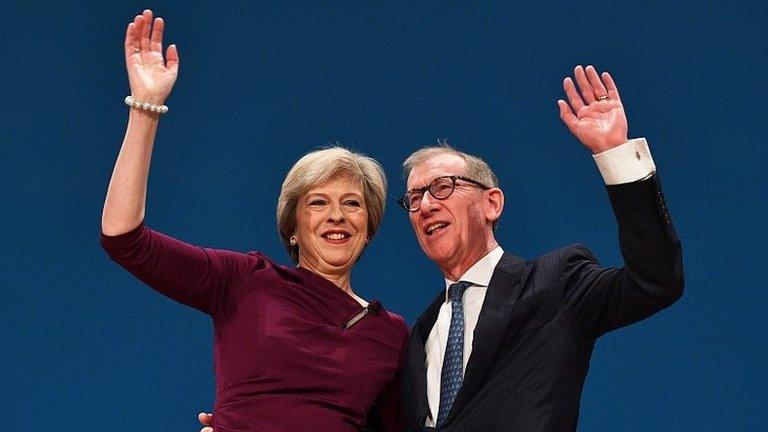Reality Check: Do foreign workers take jobs and cut wages?
- Published
![Theresa May saying: [For] someone who finds themselves out of work or on lower wages because of low-skilled immigration, life simply doesn’t seem fair.”](https://ichef.bbci.co.uk/ace/standard/976/cpsprodpb/16296/production/_91547709_may_immigration_quote.gif)
The claim: Foreign workers take away jobs from British workers and reduce their wages.
Reality Check verdict: Non-UK workers have no effect on the employment of UK-born workers, except during an economic downturn. Foreign workers may affect pay, especially for less skilled workers.
In her speech to the Conservative Party Conference this week, Prime Minister Theresa May appealed to people who had been hurt by immigration.
"I know a lot of people don't like to admit this - [for] someone who finds themselves out of work or on lower wages because of low-skilled immigration, life simply doesn't seem fair."
What can we say about the impact of immigration on the labour market?
There were 3.45 million non-UK citizens working in the UK, of whom 2.23 million were citizens of EU countries, according to the figures for April to June 2016 from the Office for National Statistics, external.
To put that into context, about 11% of the people working in the UK are non-UK nationals.
Are they taking away jobs from British workers?
This question was tackled earlier this year by Paul Johnson, from the Institute for Fiscal Studies, external.
He said that foreign workers do take jobs away from the domestic workforce in football's Premier League, where there are only 20 teams and so every player hired from other countries means there is one job fewer for a British player.
But the labour market as a whole does not work like that. More people in the country may mean there are more jobs.
At the moment, employment is at record levels and employment among UK nationals is also close to record levels.
Paul Johnson finds no evidence that foreign workers take away jobs from native Brits.
There was a report from the Home Office in 2014, external that found that there was no effect on native-born workers from immigration when the economy was strong.
But it also suggested that there was an effect during an economic downturn if immigration was particularly high, and when that effect was seen it was on lower skilled individuals.
Impact on wages
The second part of Mrs May's statement was about having wages depressed by immigrant workers, which is a question that Reality Check has looked into before.
The assertion that immigration has put pressure on wages is supported by a paper from the Bank of England, external last year.
It found that the area in which there had been the greatest effect on wages had been for semi-skilled and unskilled workers in the services sector, where a 10 percentage point increase in the proportion of immigrants working in the sector would be associated with a 1.88% reduction in pay.
A 10 percentage point increase in immigrants working in a sector is a lot.
The latest labour market figures from the Office for National Statistics estimated that between 1997 and 2016, the proportion of non-UK nationals working in the UK rose from 3.7% to 10.9%, an increase of 7.2 percentage points over 19 years.
Clearly, not all sectors of the economy and areas of the country are affected equally.
But it is also important not to see the impact of immigration as the only factor affecting wage levels and employment of British-born workers.
The impact of immigration is dwarfed by the effect of the strength of the economy and its growth.



- Published5 October 2016

- Published10 May 2016

- Published26 April 2016
